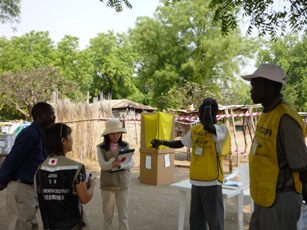Japanese observer mission’s fair and peaceful referendum declaration
January 20, 2010 (JUBA) – The Japanese referendum observation mission to Sudan has fully recognized the peaceful, fair and transparent manner in which the week- long self-determination referendum vote was conducted in Sudan.

The CPA was the 2005 agreement to lay down arms after more than two decades of civil war, in which 2 million died, between north and south Sudan.
“The mission recognizes and welcomes that the overall referendum process was generally carried out in a free, fair, and peaceful manner without any major disturbances,” states the assessment report.
Overall, the mission dispatched a total of 15 observers, consisting of members drawn from academia, non-governmental organisations (NGOs) and government. As part of its mandate the team reportedly observed the preparatory process, polling and sorting in Sudan’s capital Khartoum and Juba, the Southern Sudan capital.
According to the mission’s report, a total of 49 referendum centres were observed in Khartoum, while in the south, 81 centres covering all 15 payams (districts) in Juba County, Central Equatoria State were observed. The mission also conducted over 240 observations during the seven days of balloting.
Meanwhile the Japanese observer mission said its team observed some technical issues such as: the poor circulation of the Southern Sudan Referendum Commission’s (SSRC) directions; lack of transportation for voters living in remote areas; and insufficient food and water supplies for the staff.
The report further says, “Notwithstanding those cases and technical problems mentioned above, the mission considers that they will not affect the fairness of the referendum.”
The mission, however, lauded efforts by both the federal government and its South Sudan counterpart for what it described as timely conduct of the polls, despite the fact that preparations were behind schedule, due to numerous challenges.
The UN Integrated Referendum and Electoral Division; International Organization for Migration; and international and domestic observations organisations were some of the entities acknowledge by the Japanese mission for the various support extended towards the overall referendum process.
(ST)
